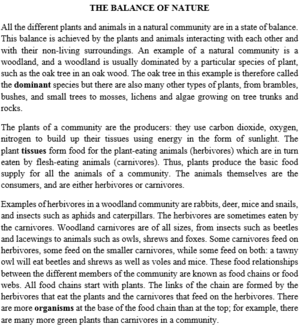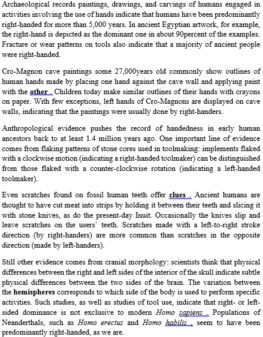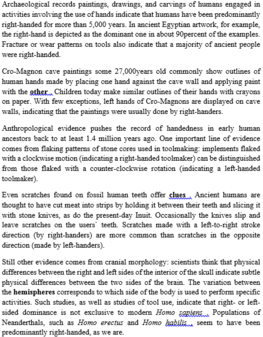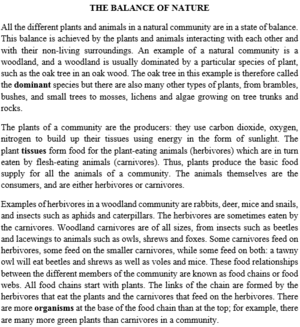Read the following passage and mark the letter A, B, C or D to indicate the correct answer to each of the questions from 36 to 42.
Diversity is a hallmark of life, an intrinsic feature of living systems in the natural world. The demonstration and celebration of this diversity is an endless rite. Look at the popularity of museums, zoos, aquariums and botanic gardens. The odder the exhibit, the more different it is from the most common and familiar life forms around us, the more successful it is likely to be. Nature does not tire of providing oddities for people who look for them. Biologists have already formally classified 1.7 million species. As many as 30 to 40 million more may remain to be classified. (1)
Most people seem to take diversity for granted. If they think about it at all they assume it exists in endless supply. Nevertheless, diversity is endangered as never before in its history. Advocates of perpetual economic growth treat living species as expendable. As a result an extinction crisis of unprecedented magnitude is under way. Worse yet, when diversity needs help most, it is neglected and misunderstood by much of the scientific community that once championed it. (2)
Of the two great challenges to the legitimacy of this diversity, the familiar one comes primarily from economists. Their argument, associated with such names as Julian Simon, Malcolm McPherson and the late Herman Kahn, can be paraphrased: "First, if endangered species have a value as resources - which has been greatly exaggerated - then we should be able to quantify that value so that we can make unbiased, objective decisions about which species, if any, we should bother to save, and how much the effort is worth. Secondly, the global threat to the diversity of species, particularly in the tropics, has been overestimated. Thirdly, we have good substitutes for the species and ecosystems that are being lost, and these substitutes will nullify the damage caused by the extinctions". (3)
The structure of the argument seems to me to be identical in form to that of an old joke from the American vaudeville circuit. One elderly lady complained to another about her recent vacation at a resort in the Catskill Mountains in New York State. "The food was terrible", she moaned. "Pure poison, I couldn't eat a bite. And the portions were so tiny!" (4)
Species may be valuable, but not especially so, and the threat to them has been exaggerated. But this does not matter anyway, say the economists, because we can replace any species that vanishes.(5)
It is not clear how much of an impact this argument has on the informed public, but it has certainly provoked an outcry among scientific conservationists. It has set the terms for, and dominated, most of the pro-diversity literature of the past few years, making it a literature of response, thus limiting its scope and creative force.
Question 42: The position of the scientific conservationists has been weakened because they have _________.
A. adopted the economists' arguments.
B. failed to communicate with public.
C. lost the initiative in the debate.
D. protested too loudly.









Đáp án C
Giải thích: Vị trí của những nhà bảo tồn khoa học trở nên yếu thế hơn bởi vì họ đã _______.
A. lấy lý lẽ của những nhà kinh tế học
B. thất bại trong việc đối thoại với cộng đồng
C. mất đi vị thế chủ động trong cuộc tranh luận
D. phản kháng quá kịch liệt
Giải thích: Thông tin ở đoạn cuối cùng “It is not clear how much of an impact this argument has on the informed public, but it has certainly provoked an outcry among scientific conservationists. It has set the terms for, and dominated” [Không rõ là ảnh hưởng của những lý lẽ này đến công chúng ra sao, nhưng chắc chắn rằng nó đã dẫn đến sự phản đối kịch liệt của những nhà bảo tồn khoa học. Nó đã đặt ra giới hạn và áp đảo. . .] Lí luận của nhà kinh tế chiếm thế chủ đạo, nghĩa là vị trí của nhà bảo tồn khoa học sẽ ngược lại là mất đi, yếu hơn.